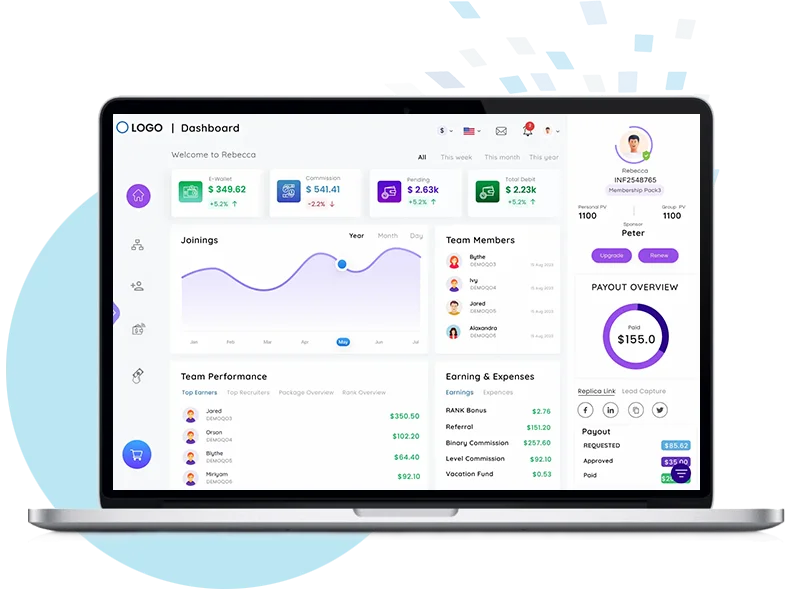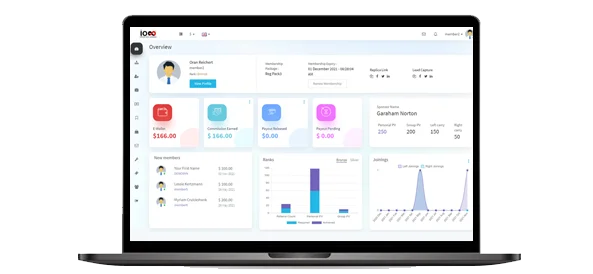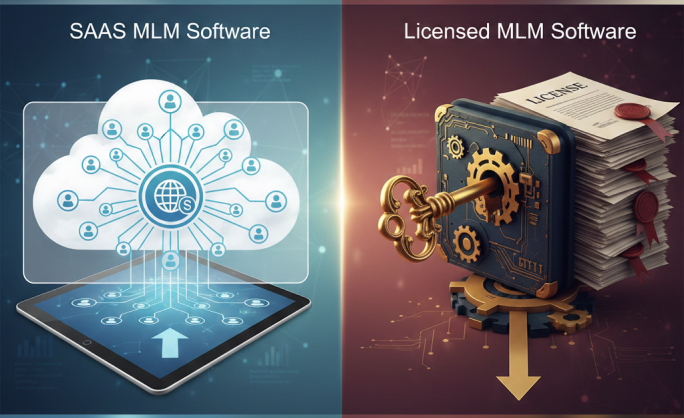In Multi Level Marketing success, As you know, success is tied between the commissions earned by the collective efforts of a vast network of distributors.
This commission plays an imperative role in MLM businesses to fuel motivation, drive sales performance, and incentivize distributor engagement. However, commission management encompasses the amalgamation of a myriad of things and without automation it’s a hassle. This is where MLM software steps in, offering a comprehensive solution to streamline commission processes.
In this blog, we delve into the significance of commission management in MLM, highlighting its role in driving success and the necessity for efficient management practices. Read on!
What is Commission Management?
MLM commission management encompasses the strategic and operational processes required for efficiently calculating, distributing, and tracking commissions earned by distributors for their sales efforts and those of their downline network. This process involves calculations based on various factors such as sales volume, hierarchical levels, product types, and compensation plans. This ensures that the commission structure is in line with organizational objectives and adheres to legal and regulatory standards.
The Role of Commission Management
Commission management is not just a mere administrative task; it’s the cornerstone of incentivizing and rewarding distributors for their hard work, while simultaneously ensuring the profitability and sustainability of the MLM business model.
The Importance of Commission Management in MLM
Motivating Distributors
Commission structures serve as powerful motivators for distributors, driving them to increase sales and expand their network. By accurately and fairly rewarding their efforts, commission management fosters a culture of productivity and ambition within the MLM community.
Retention and Loyalty
Fair and transparent commission management practices enhance distributor satisfaction and loyalty. When distributors feel adequately compensated for their contributions, they are more likely to remain engaged with the MLM company, reducing churn rates and fostering long-term relationships.
Business Sustainability
Effective commission management is essential for the long-term sustainability of an MLM business. By aligning commissions with revenue generation and cost management, companies can ensure profitability while incentivizing growth and expansion.
Performance Evaluation
Commission management systems provide valuable insights into the performance of individual distributors, teams, and the overall network. By analyzing commission data, MLM companies can identify top performers, pinpoint areas for improvement, and refine their strategies for maximum efficiency.
Different Type of Commision Structures in MLM

From personal sales commissions to leadership bonuses, each type plays a crucial role in incentivizing and rewarding network members. Let’s delve into the different types of commission structures in MLM:

Personal Sales Commissions
Personal sales commissions reward distributors for selling products directly to customers. This straightforward structure provides immediate gratification for individual efforts, motivating distributors to drive sales and generate revenue.

Downline Commissions
Downline commissions reward distributors for the sales generated by their downlines. As distributors recruit and build their teams, they earn a percentage of the sales volume generated by their downline members.

Leadership Bonus
Leadership bonuses, also known as team or group bonuses, typically reward distributors based on the sales volume or performance of their entire downline members, incentivizing effective leadership and team development.

Rank Advancement Bonus
Rank advancement bonuses reward distributors for reaching higher levels or ranks within the company’s compensation plan. These bonuses serve to provide tangible rewards for dedication, perseverance, and achievement.
Advantages of Effective Commission Management
 Accurate and Timely Payouts
Accurate and Timely Payouts
By automating commission calculations and payout processes, MLM companies minimize the risk of errors and streamline operations. Distributors can trust that their efforts will be rewarded promptly, fostering a sense of reliability and trust in the company. Accurate and timely payouts not only motivate distributors to continue their efforts but also strengthen their loyalty to the MLM brand, driving long-term success.
 Transparent Compensation Plans
Transparent Compensation Plans
Commission management enables MLM companies to develop and communicate transparent compensation plans to their distributors. With clear visibility into how commissions are calculated and distributed, distributors can better understand their earning potential and the rewards for their performance. Transparent compensation plans prevent misunderstandings and disputes, fostering a positive relationship between the company and its distributors.
 Incentivize Sales Performance
Incentivize Sales Performance
Effective commission management allows companies to design attractive commission structures and bonuses that motivate distributors to achieve and exceed their sales targets. Whether through tiered commission rates, volume-based bonuses, or performance incentives, commission management systems provide the framework for rewarding top performers and encouraging others to strive for excellence.
 Earnings Management
Earnings Management
With robust commission management systems in place, MLM companies can track and manage distributor earnings in real-time. Distributors have access to detailed reports and dashboards that allow them to monitor their commissions, track sales performance, and plan their business activities effectively. This transparency empowers distributors to make informed decisions about their business and financial goals.
 Brand Credibility
Brand Credibility
Effective commission management plays a crucial role in building brand credibility by ensuring that distributors are fairly compensated for their efforts. When distributors receive accurate and timely commissions, they become advocates for the company, promoting its integrity and reliability to potential recruits and customers. A reputation for fair and transparent compensation practices enhances the credibility of the MLM brand, attracting top talent and driving customer loyalty.
 Ensure Legal and Regulatory Compliance
Ensure Legal and Regulatory Compliance
Commission management systems help MLM companies navigate complex legal frameworks and ensure that their compensation plans adhere to relevant laws and regulations. By automating compliance checks and implementing robust controls, commission management systems minimize the risk of legal challenges and regulatory fines. Distributors can trust that their earnings are derived from legitimate and compliant business activities.
Challenges In Commission Management In MLM Business
At the heart of every MLM venture lies a complex web of compensation plans, intricate tracking systems, and the critical need for compliance. Yet, beneath the surface of opportunity lies a landscape riddled with challenges. Let’s explore the hurdles that often obscure the path to MLM success.
 Complex Compensation Plans
Complex Compensation Plans
One of the defining characteristics of MLM businesses is their diverse array of compensation plans. From binary to matrix, unilevel to hybrid, each plan comes with its own set of rules, bonuses, and commission structures. However, this diversity also breeds complexity. Managing multiple compensation plans simultaneously can overwhelm even the most seasoned MLM professionals. Aligning these plans with the company’s objectives while ensuring fairness and transparency poses a significant challenge.
 Tracking Multi-Level Commissions
Tracking Multi-Level Commissions
In MLM, commissions go down through multiple levels of the organization, creating a network of transactions to monitor and manage. Tracking these multi-level commissions accurately is no small thing. As the network grows, so does the complexity of commission tracking, making it a challenge for MLM businesses to maintain transparency and trust.
 Errors
Errors
In MLM, even minor errors in commission calculations can have far-reaching consequences. Whether it’s a miscalculation in bonus payouts or a glitch in the tracking system, errors affect trust and tarnish the reputation of the business. Identifying and rectifying these errors promptly is crucial to preserving the integrity of the MLM network. However, without robust systems in place, detecting and resolving discrepancies can become a herculean task.
 Scalability and Growth Limitations
Scalability and Growth Limitations
As the network expands, so does the volume of transactions and the complexity of commission management. Outdated systems that can’t keep up with rapid growth might struggle, holding back the company’s ability to expand. Moreover, rigid structures and processes can impede agility, hindering the MLM business’s ability to adapt to evolving market dynamics.
 Aligning with Compliance Policies
Aligning with Compliance Policies
MLM businesses must navigate a labyrinth of legal and ethical guidelines to ensure their operations remain above board. From adhering to anti-pyramid scheme regulations to complying with tax laws, the compliance burden weighs heavily on commission management. Failure to align with these policies not only exposes the business to legal issues but also weakens trust among network members and consumers alike.
With the intricacies of commission structures and the ever-growing network of distributors, manual management can quickly become exhausting and prone to errors. Fortunately, advancements in technology have paved the way for MLM commission management software, revolutionizing the way commissions are handled.
MLM commission management software is designed to streamline the entire commission process, from calculations to payouts, ensuring accuracy and efficiency every step of the way.
Here are the key advantages of this software:
- Commission management software automates the entire process, saving valuable time and effort.
- The software significantly reduces the risk of inaccuracies, improving accuracy and ensuring that each distributor receives the correct commission.
- By ensuring timely and accurate commission payouts, the software enhances distributor satisfaction, fostering loyalty and motivation.
- Commission management software offers scalability and flexibility to accommodate the expanding network of distributors and evolving commission structures.
- Commission management software eliminates manual errors, providing a reliable and error-free system.
- With commission management software, both the company and its distributors have access to real-time commission data, fostering trust and transparency.
- Automating the process, the software frees up valuable resources that can be redirected towards business growth and development.
- Commission management software offers advanced customization options, allowing businesses to tailor the system to their specific needs and preferences.
Key Features And Functionalities of MLM Commission Management Software
Admin Privileges
For MLM businesses, having robust commission management software with tailored features for admin privileges can make all the difference in streamlining operations and maximizing earnings. Let’s explore the key features and functionalities designed to empower administrators in effectively managing commissions and bonuses:
1.Manage Commissions and Bonuses
Admins have the authority to oversee and adjust commission and bonus structures based on company policies and performance metrics. With intuitive interfaces, they can easily set commission rates and bonus thresholds to incentivize distributors.
2.Calculate and Process Commissions
Commission management software automates the complex calculations involved in determining commissions and bonuses, saving admins valuable time and eliminating errors. Admins can trust that payouts are accurate and timely, fostering trust and satisfaction among distributors.
3.Track Distributor Sales
Admins can track individual distributor sales performance in real-time, gaining valuable insights into productivity and identifying top performers. This feature enables targeted support and coaching to drive sales and enhance distributor success.
4.Genealogy View
A genealogy view provides admins with a comprehensive visual representation of the MLM network hierarchy, including downline structures and relationships. This bird’s-eye view facilitates strategic decision-making and helps admins identify areas for growth and optimization.
5.Manage Individual and Team Commission Metrics
Admins can delve into detailed commission metrics at both the individual and team levels. This granular visibility allows for tailored analysis and optimization strategies to maximize earnings and incentivize teamwork.
6.Access to Overall Sales Data
Commission management software provides admins with access to comprehensive sales data, including total revenue, product performance, and market trends. Armed with this information, admins can make informed decisions to drive business growth and profitability.
7.Audit Commission Requests and Payouts
Admins can audit commission requests and payouts to ensure compliance with company policies and regulations. This feature enhances transparency and accountability, safeguarding against fraud and discrepancies.
8.Payment Methods Management
Admins have the flexibility to manage various payment methods, by integrating different payment gateways. This ensures seamless and convenient commission payouts for distributors, enhancing satisfaction and loyalty.
9.Report Generation
Commission management software generates detailed reports on commission earnings, bonuses, sales performance, and more. These reports provide admins with valuable insights for strategic planning, performance evaluation, and compliance monitoring.
Distributor Privileges
Now let’s look at the distributors privileges offered by a commission management software:
1.Individual and Team Commission Overview
Distributors have access to comprehensive overviews of both their individual commission earnings and their team’s performance. This feature provides valuable insights into their contribution to the MLM network and motivates teamwork towards achieving collective goals.
2.Report Generation on Sales and Commissions
Empowered with the ability to generate detailed reports on sales performance and commission earnings, distributors can track their progress and identify areas for improvement. These reports offer invaluable insights for strategic planning and goal-setting.
3.Goal Tracking
Commission management software allows distributors to set and track their sales goals in real-time. This feature keeps distributors focused and motivated towards achieving their objectives.
4.Genealogy View
With a genealogy view, distributors gain a clear understanding of their network structure, including their downline and upline relationships. Visualizing their network hierarchy enables distributors to identify growth opportunities, nurture relationships, and strategically expand their network.
5.Place or Withdraw Requests
Distributors have the convenience of placing commission withdrawal requests or updating their payment preferences directly through the software. This streamlines the payout process and ensures timely access to earned commissions, enhancing satisfaction and motivation.
6.Preferred Payment Method
Commission management software offers flexibility in choosing preferred payment methods, whether it’s direct deposits, checks, or digital wallets. Distributors can select the option that best suits their needs and preferences, ensuring seamless and convenient commission payouts.
How to Choose the Right MLM Software?

Selecting the right MLM software is a critical decision for businesses operating in the MLM industry. With the advancement of technology and the increasing complexities of MLM networks, having the right software solution can make all the difference in streamlining operations, maximizing efficiency, and driving success. Below are the essential factors for selecting the right MLM software
1. Size and Complexity of MLM Network
The size and complexity of your MLM network play a significant role in determining the right software solution. Whether you’re a small-scale operation or a large enterprise with a vast network of distributors, the software should be capable of handling the scale and intricacies of your MLM structure effectively.
2. Level of Automation
Efficient commission management relies on automation to streamline processes and minimize manual intervention. Look for MLM software that offers robust automation capabilities, from calculating commissions to processing payouts, ensuring accuracy and efficiency across the board.
3. Customization Requirements
Every MLM business is unique, with its own set of commission structures, compensation plans, and business requirements. The right software should offer flexibility and customization options to tailor the system to your specific needs, ensuring seamless integration with your business processes.
4. Consider Your Budget Constraints
Budget constraints are a crucial consideration when selecting MLM software. While it’s tempting to opt for the most feature-rich solution, it’s essential to weigh the costs against the benefits and ensure that the software aligns with your budgetary limitations without compromising on essential functionalities.
5. Integration Capabilities
MLM software doesn’t operate in isolation but needs to integrate seamlessly with other tools and platforms used in your business ecosystem. Consider the integration capabilities of the software, including compatibility with CRM systems, e-commerce platforms, and payment gateways, to ensure smooth data flow and interoperability.
6. Support
Effective support and reliable customer service are invaluable when it comes to implementing and managing MLM software. Choose a provider that offers comprehensive support services, including technical assistance, training resources, and ongoing maintenance, to ensure a smooth and hassle-free experience for your team.
Closing Remarks
By implementing robust commission management systems, MLM companies can streamline operations, minimize errors, and maximize efficiency, ultimately leading to greater profitability and growth. Moreover, the role of commission management software has become increasingly indispensable.
As the MLM industry continues to evolve and expand, the importance of effective commission management will only grow. By prioritizing commission management, MLM businesses can stay ahead of the curve.










